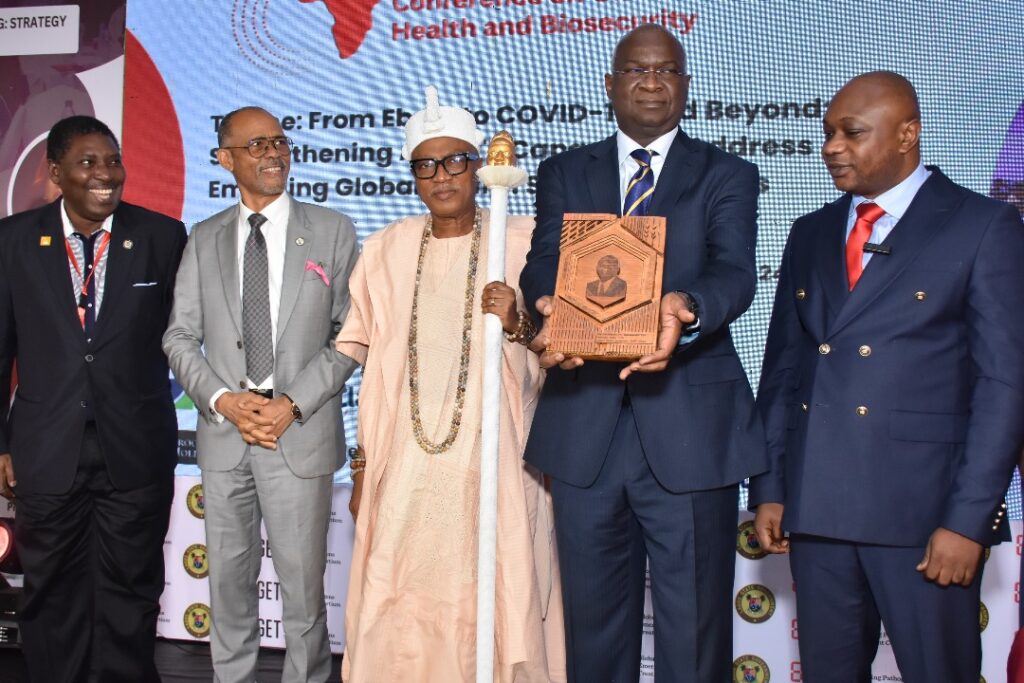
The 10th African Conference on One Health and Biosecurity took a powerful turn as former Lagos State Governor, Mr. Babatunde Fashola, Health Commissioner Prof. Akin Abayomi and GET Consortium’s Chief Operating Officer, Dr. Ayodotun Bobadoye called for immediate action to fortify Africa’s health systems. With a sharp focus on emerging disease threats and biosecurity, they emphasized the urgent need for both street-level awareness and structural reforms in Lagos and beyond.
Addressing attendees on Thursday 7 November, 2024 at the event held Oriental Hotel, Lekki, Lagos, Mr. Fashola emphasized the need to prepare Africa for the inevitable emergence of new pandemics, highlighting lessons learned from Lagos State’s battle against Ebola. “It was the first time Ebola surfaced in an urban environment,” he said, reminding the audience that pandemics will continue to be a reality. “We need to prepare rigorously for more pandemics. Antimicrobial resistance is a pressing concern, with antibiotics becoming less effective. This is no longer an abstract issue but one with immediate consequences,” he warned.
Fashola underscored the importance of fostering grassroots understanding of biosecurity challenges, saying, “Healthcare is serious business — not just about doctors and hospital beds, but pharmacology, sanitation, and more.” He urged strict enforcement of environmental laws, adding, “Open defecation and poor sanitation threaten public health. Urban planners and environmental regulators must prioritize sanitation as it’s our first line of defense.”
Fashola proposed a greater investment in educational documentaries to raise public awareness. “Storytelling is key to building understanding. A documentary could help tell the story of how Lagos battled Ebola and COVID-19, informing and inspiring the next generation,” he suggested, encouraging funders to invest in this endeavor.
In his presentation titled: Strengthening and Sustainability of Lagos State’s Health System, the Lagos State Commissioner for Health, Prof. Akin Abayomi offered insights into Lagos State’s health initiatives under the Lagos Development Plan 2052, which aims to boost both healthcare infrastructure and human resources. He highlighted goals such as increasing the intake of healthcare professionals from 100 to 1,000 annually and leveraging private sector partnerships to enhance primary healthcare. “The private sector will be pivotal in addressing Lagos’ healthcare needs,” he stated, urging more local investment to reduce medical tourism.
Abayomi provided an analysis of Lagos’ healthcare landscape, stating that Lagos registered around 1,800 private healthcare facilities, 31 secondary public hospitals, five tertiary facilities, and 326 primary centers. “Lagos State serves as a healthcare hub, with over 12.5 million accessing care here annually. Yet, significant bed shortages mean we need a strategy to close this gap, through public and private investment,” he explained.
According to Prof. Abayomi, the state must also address the $1.5 billion Nigerians spend on medical treatment abroad each year. “Orthopedics, cardiology, and oncology are among the top specialties that drive outbound medical tourism,” he said. The state’s new strategic initiatives focus on making Lagos a leading destination for healthcare and reversing this trend.
Reflecting on the conference’s theme, Abayomi argued that Africa must adopt a holistic health system that integrates public and private sectors. “To tackle emerging threats, we need to streamline resources, upgrade health infrastructure, and enhance our response capacity,” he said. Abayomi reiterated Lagos’ commitment to mandatory health insurance and universal health coverage, stating that a healthier population translates to a stronger economy.
The COO of GET Consortium, Dr. Ayodotun Bobadoye centered his presentation on the Lagos State Biosecurity Policy, an initiative aiming to shield human, animal, and environmental health. “Biosecurity is about mitigating risks to human, animal, and plant life, with laboratory biosecurity gaining attention worldwide,” Bobadoye noted. He stressed that safeguarding labs from unauthorized access is essential in an era where non-state actors pose real threats.
“Biosecurity is about more than humans; it’s a shared responsibility encompassing animals and plants,” Bobadoye added. With Lagos’ dense population and environmental vulnerabilities, he noted that outbreaks such as Ebola, monkeypox, and waterborne diseases pose unique challenges. “Lagos’ population density, slum conditions, and pollution create an ideal breeding ground for pathogens.”
He disclosed that a recent WHO Joint External Evaluation (JEE) of Lagos indicated that the state’s biosecurity preparedness sits at a concerning 36% readiness level. This evaluation, according to Bobadoye, shows that while Lagos is a leader within Nigeria, it falls short of international standards. “We need budget allocations and inter-agency coordination to better equip Lagos for epidemic preparedness,” he stressed, highlighting collaboration between sectors like agriculture, environment, and health. “Collaboration across government sectors and with private entities will be essential to prepare Lagos for future challenges,” he said.
With recommendations to strengthen laboratory capacities and bolster collaboration across MDAs, Bobadoye outlined GET’s goals for the state’s biosecurity policy, set to be implemented by early next year. “The policy will offer guidelines to manage biosecurity risks, prevent misuse of pathogens, and foster collaboration,” he affirmed. He also called for the empowerment of veterinary and public health laboratories.
In closing, the speakers agreed on a unified approach to biosecurity, one that embraces the One Health concept, recognizing the interconnectedness of human, animal, and environmental health. As Fashola put it, “Our resilience in health security will depend on the strength of our collective commitment to preparedness.”
For Advert, Event Coverage/Press Conference
Invite, Story/Article & Other Media Services
Contact Us On WhatsApp
Send Email To: citizennewsng@gmail.com
Visit Citizen NewsNG To Read More Latest And Interesting News Across Nigeria And The World














